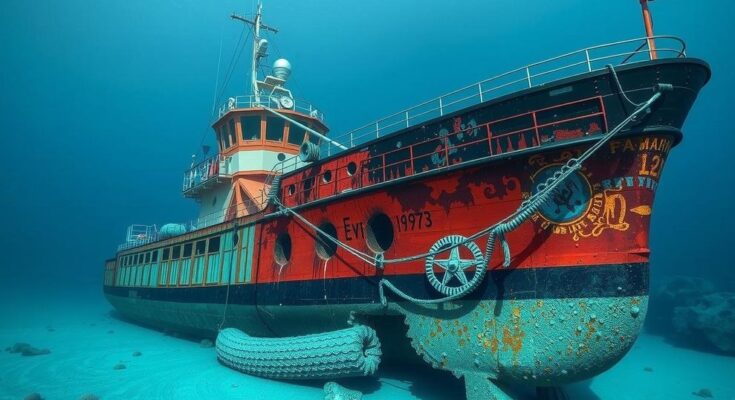The Capitan Canepa, a historic research vessel in Argentina, sank unexpectedly on December 4, just before its intended conversion into an artificial reef. The ship had served as a significant research tool for over 40 years, participating in numerous scientific missions. Although it sank due to a deteriorated hull, no environmental harm occurred since it was devoid of harmful materials. Its sinking is viewed as a fitting end to its storied maritime history, contributing to marine life instead of ending up in a scrapyard.
On December 4, the historic research vessel Capitan Canepa unexpectedly sank at the Mar del Plata Naval Base in Argentina. The ship, which had served as a significant asset in marine research for over four decades, was scheduled to become part of an artificial reef designed to enhance marine life. Originally built as a fishing vessel in 1964, it was acquired by Argentina’s National Fisheries Institute (INIDEP) in 1979, where it completed more than 200 scientific missions, including participation in search and rescue operations during the Falklands conflict in 1982.
Despite its storied history, years of neglect due to labor disputes led to the vessel’s deterioration. By 2019, it was decommissioned, and plans for its transformation into an artificial reef were finalized. However, shortly before this could happen, the Capitan Canepa sank while still docked, allegedly due to a weakened hull that allowed water intrusion. Fortunately, no crew members were on board, and the vessel had already been cleared of harmful materials, averting any environmental concerns. Emergency teams promptly implemented pollution control measures to ensure the safety of surrounding waters. Local media have described the sinking as a serene conclusion for a vessel that spent decades at sea, allowing it to fulfill its final purpose as part of the ocean ecosystem.
The Capitan Canepa held a vital role in Argentina’s marine research efforts, contributing to the understanding of oceanic ecosystems and fish populations. Originally a fishing vessel, its transition to a research ship marked a significant evolution in its purpose. Despite its achievements and contributions, lack of maintenance led to the vessel’s decline, necessitating its transformation into an artificial reef to support marine life. The sinking incident highlights both the historical significance of the vessel and the importance of proper maintenance for maritime resources.
The sinking of the Capitan Canepa prior to being transformed into an artificial reef underscores the impact of neglect on historic vessels. While the ship’s demise occurred unexpectedly, it will still play a role in fostering marine biodiversity as part of the ecosystem. The incident serves as a reminder of the significance of maintaining valuable maritime assets and the potential for these vessels to contribute to environmental conservation efforts even in their final days.
Original Source: www.marineinsight.com




